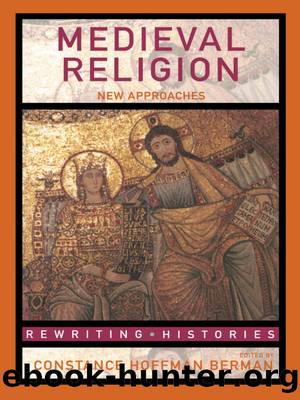Medieval Religion by Berman Constance H

Author:Berman, Constance H.
Language: eng
Format: epub
Publisher: Taylor & Francis (CAM)
Published: 2011-09-15T00:00:00+00:00
Boniface VIII
With the pontificate of Clement V we have gone beyond our period. Already, however, in Boniface VIIIâs time, it would seem that the old view of the papacy as embracing pope and cardinals was losing ground even in the college itself. Boniface made it clear that he thought he could act without the cardinals if necessary. Berengar Fredoli, cardinal bishop of Tusculum in the late thirteenth century, told the ambassador of the king of Aragon not to bother presenting his case in consistory, since Boniface never brought anything up in consistory except what he chose not to do.85 He held weekly consistories for routine matters, but reserved all important affairs to himself and a small handful of trusted colleagues, and would brook no contradiction in consistory.86 There was clearly a growing antipathy between him and some of his cardinals, in part the residue of rivalries which had sprung up during the pontificate of Celestine V.
This came to a head during the quarrel (c. 1310) with the Colonnese cardinals, James and Peter, which dramatized a sovereignty of the popeâs person so great as to leave no room for the aspirations or ambitions of the cardinals. Much of the complaint that the Colonnesi made against Boniface was based on the assumption that the status or juridical character of the cardinals was perpetual.87 But Boniface, we are told, would have none of this:
Some might say that the cardinals do not have status. They do and they donât, since he who is established in plenitude of power over all and has the power to loose and to bind, as the vicar of Jesus Christ, is chosen by and proceeds from their canonical election. Indeed, there is no one, after the Roman pontiff himself, who has such an elevated status as this. It is well known that they are members of our head.
However, they do not have the status of preeminence that the pope has. No one else has this kind of status except the pope alone, since he is not beneath that of anyone inferior to him. But the cardinals who have status are beneath the status of the Roman pontiff, who has power to correct and to punish them.88
In the early stages of their struggle with Boniface, the Colonnese cardinals were not the only members of the college to oppose the pope. Several of their colleagues were in touch with King Philip IV of France, attacking Boniface behind his back. In April 1311, before an investigative commission set up by Clement V, the names of several of these emerged, the most prominent being John Lemoine, no friend of the pope. He admitted that he had told Philip IV that he thought Boniface was a heretic, presumably when he had been a legate in France, since he added that he could not remember having written to the king on the subject.89 Rumors flew of a serious split in the college and a bitterness among those who were, for one reason or another, at odds with Boniface.
Download
This site does not store any files on its server. We only index and link to content provided by other sites. Please contact the content providers to delete copyright contents if any and email us, we'll remove relevant links or contents immediately.
A World Ablaze by Craig Harline(703)
Winning the War in Your Mind by Craig Groeschel(697)
White Too Long by Robert P. Jones(642)
In the Reign of King John by Dan Jones(638)
The Mission by David W. Brown(631)
History of the Church by Eusebius(610)
Beautiful Resistance: The Joy of Conviction in a Culture of Compromise by Jon Tyson(596)
No More Christian Nice Guy by Paul Coughlin(589)
A Spacious Life by Ashley Hales(567)
Three Messiahs : The Historical Judas the Galilean, the Revelatory Christ Jesus, and the Mythical Jesus of Nazareth (9781450259477) by Unterbrink Daniel T(559)
The Crusades: A History by Jonathan Riley-Smith(557)
The Black Church by Henry Louis Gates Jr(548)
The History of Palestine by John Kitto(515)
The Zionist Bible (BibleWorld) by Masalha Nur(512)
The Tale of the Tardy Oxcart (Swindoll Leadership Library) by Swindoll Charles R(507)
Why Study History? by John Fea(505)
Assassination of a Saint by Eisenbrandt Matt(487)
Descent Into Hell by Charles Williams(485)
The Cheese and the Worms: The Cosmos of a Sixteenth-Century Miller by Carlo Ginzburg(472)
